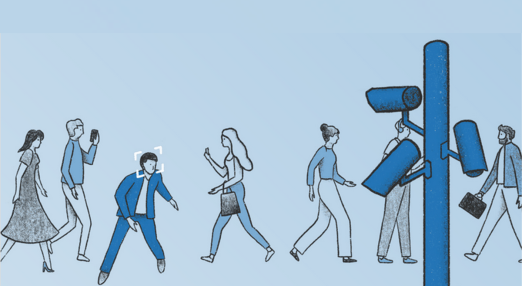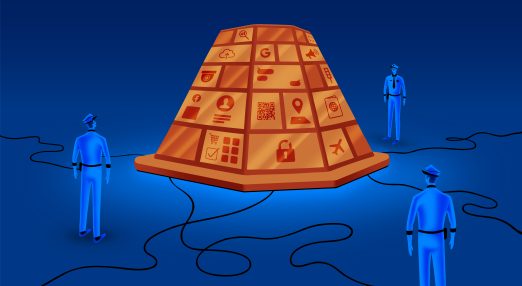data protection
Filter by...
-

Spying on couriers and AdTech using data from operators. We know the winners of the Czech Big Brother Awards
For the seventeenth time has the Czech NGO and EDRi member Iuridicum Remedium (IuRe) awarded Big Brother Awards to those who have been snooping the most into our privacy in the past year.
Read more
-

Giropay knows what you bought last summer
A customer contacted noyb after seeing a detailed list of products she had ordered in an online pharmacy and a sex shop listed in her giropay account. Such data is specially protected under the GDPR and may not be processed without consent. noyb filed a complaint against giropay with the Hessian State Commissioner for Data Protection and Freedom of Information.
Read more
-

The European Commission does not sufficiently understand the need for better AI law
The Dutch Senate shares the concerns Bits of Freedom has about the Artificial Intelligence Act and wrote a letter to the European Commission about the need to better protect people from harmful uses of AI such as through biometric surveillance. The Commission has given a response to this which is not exactly reassuring.
Read more
-

Declaration of Digital Principles: Towards a digital pillar of the EU?
On 26 January the European Commission proposed a Declaration on European Digital Rights and Principles. The Declaration will take the form of a joint solemn declaration to be signed by the European Parliament, the Council, and the Commission.
Read more
-

Technologies for border surveillance and control in Italy
This research points out that identification and categorisation systems for migrants, refugees, and asylum-seekers, rely on vast quantities of biometric data including fingerprints and facial images. It is, however, often difficult to assess how these procedures are managed. Upon identification, the aforementioned groups have limited knowledge and awareness about where and how their personal and biometric data are going to be stored and used, hindering them from countering the pressure that this flow of information puts on their subsequent living conditions in Italy and in the European Union.
Read more
-

Cross-border access to user data by law enforcement in 2021: A year in review
Law enforcement agencies around the world are getting their holiday wish list, thanks to the Council of Europe’s adoption of a flawed new protocol to the Budapest Convention, a treaty governing procedures for accessing digital evidence across borders in criminal investigations.
Read more
-

EDPS sanctions the European Parliament for illegal EU-US data transfers – among other violations
In January 2021, noyb filed a complaint against the European Parliament on behalf of six Members of the European Parliament over an internal corona testing website. The issues raised were deceptive cookie banners, vague and unclear data protection notices, and the illegal transfer of data to the US.
Read more
-

Online surveillance thrives when fear takes over
European law-enforcement agencies have been pushing to end encryption and survey everyone’s online communications.
Read more
-

2021: Looking back at digital rights in the year of resilience
We started 2021, hoping to leave the tremendously challenging year of 2020 behind. The Covid-19 pandemic has had a devastating impact on our societies, causing unprecedented harm to people and economies. If 2020 was the year of the pandemic shock, 2021 was the year of resilience. We had to learn to live in a constant uncertainty of what it would take to keep defending human rights: Could we work and walk down the streets without being constantly surveilled? Would efforts to tackle disinformation distort legitimate content, or would they bring down Big Tech instead? Will 2022 be 2021 2.0?
Read more
-

What you need to know about the Facebook Papers
Facebook is now undergoing what may be the tech giant’s biggest crisis in its 17-year history. In October, The Washington Post reported that a second Facebook whistleblower came forward to the U.S. Securities and Exchange Commission, alleging that the company prioritises growth over combating hate speech, disinformation, and other threats to the public. The whistleblower’s testimony follows that of former Facebook employee Frances Haugen, whose legal counsel released what’s known as the Facebook Papers — a 10,000-page collection of internal reports, memos, and chat logs leaked to more than a dozen major news outlets.
Read more
-

Noyb files another complaint against Amazon Europe – black box algorithm discriminates customers
The e-commerce giant offers customers the possibility to pay for products later via "Monthly Invoicing". A customer was automatically rejected from using this payment method without Amazon giving any reasons why. When Amazon’s customer service could not provide any further information, the customer submitted an access request under Article 15 GDPR in order to find out why he was rejected – but the company still refused to provide any information.
Read more
-

Why chat control is so dangerous
Fighting the dissemination of child sexual abuse material, the EU Commission is considering dangerous measures: the automated search of content on mobile phones and computers. See answers to the key questions regarding „chat control“ in Netzpolitik's overview.
Read more
